Inside the unlicensed HMOs housing migrant workers
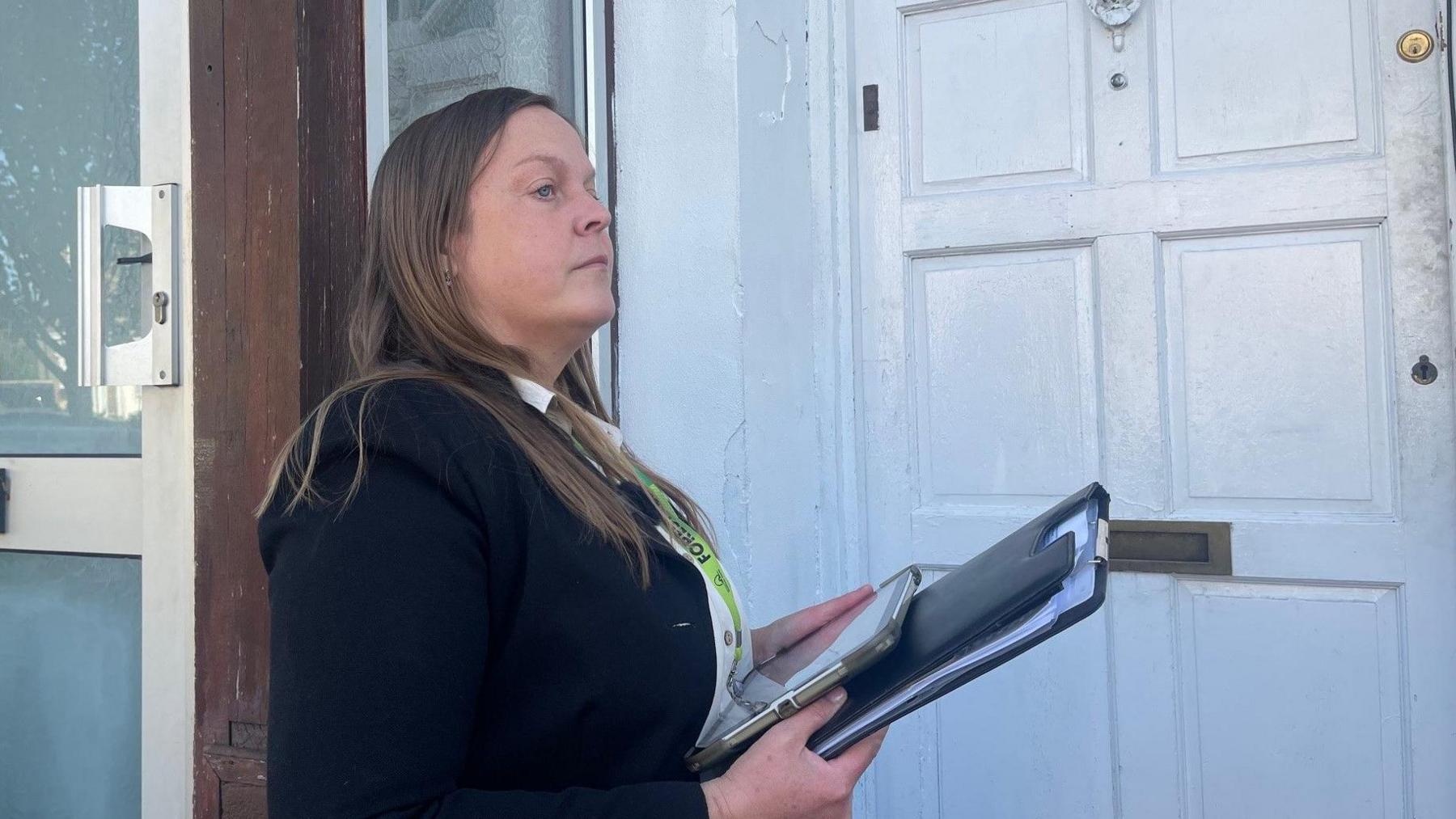
Council enforcement officer Lisa Smith waits for someone to open the door at a suspected HMO
- Published
It's barely light on a street in Leytonstone, east London, as a team of enforcement officers from the London borough of Waltham Forest knocks on a front door. The house is suspected to be an unlicensed home in multiple occupation (HMO).
The team has allowed me and a colleague to come with them and film.
An eastern European tenant in his dressing gown opened the door to us and on seeing the warrant, allowed us access.
He tried to call the landlord, whose son lives here, to let him know what was happening.
The man didn't want to be identified, but he told me he paid about £600 a month for a small, windowless bedroom on the ground floor.
He works 12-hour shifts as a concierge in a luxury apartment block.
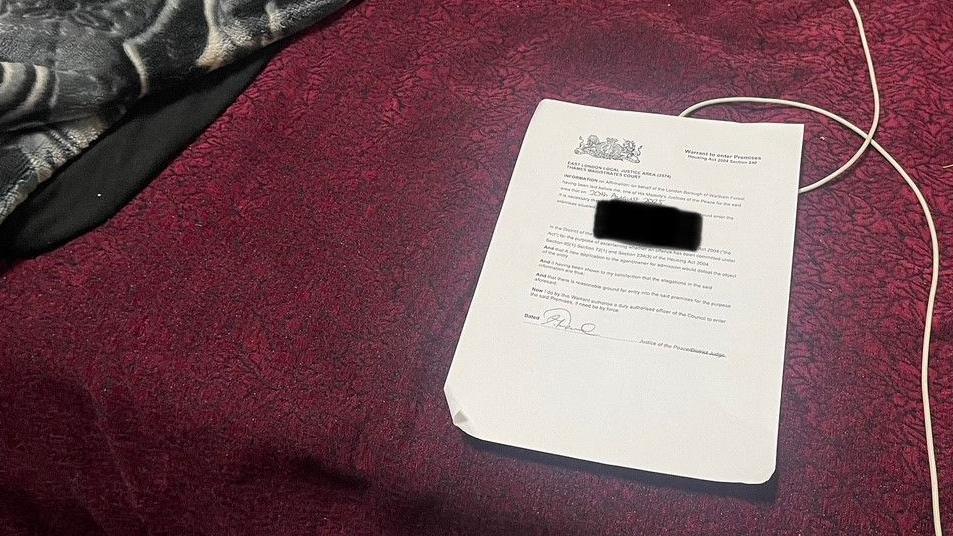
A warrant for entry from the magistrates' court was left for the absent landlord
He was one of seven or more unrelated people living in what should have been a three-bedroom terraced house, and he had been living here for six months. He didn't have to pay a deposit.
All the tenants worked shifts in London and shared a kitchen and two bathrooms.
There was no living or dining room, but there was a large kitchen the residents shared. The smoke alarms were not working, and nor were the landing lights on the first floor.
On the first floor, another tenant opened the door to his bedroom, which had a feline litter tray outside. He was also eastern European and had been living there since 2017.
His cat, he said, was to keep the mice at bay. On the wages he earns he told us, he could not afford to live anywhere else.
Landlord licences to stamp out 'dangerous' HMOs
- Published13 March
Illegal house-sharing exposed by BBC undercover filming
- Published1 August
HMO landlord told to refund tenants £20,000
- Published8 December 2023
This house was recently refused an HMO licence by Waltham Forest. It was visited unannounced six times over the summer by the housing enforcement team, and the landlord now claims he lives here with two lodgers.
There is a public register, external for licensed HMOs in the borough, and this property wasn't on it. It's not known how many unlicensed HMOs there are in Waltham Forest, but enforcement officers often carry out intelligence-led inspections.
Over the past 10 years the local authority has secured 325 criminal prosecutions, or financial penalties of up to £30,000, for each offence relating to poor quality housing.
But it doesn't stop some landlords from squeezing as many tenants as possible into properties not built to accommodate them.
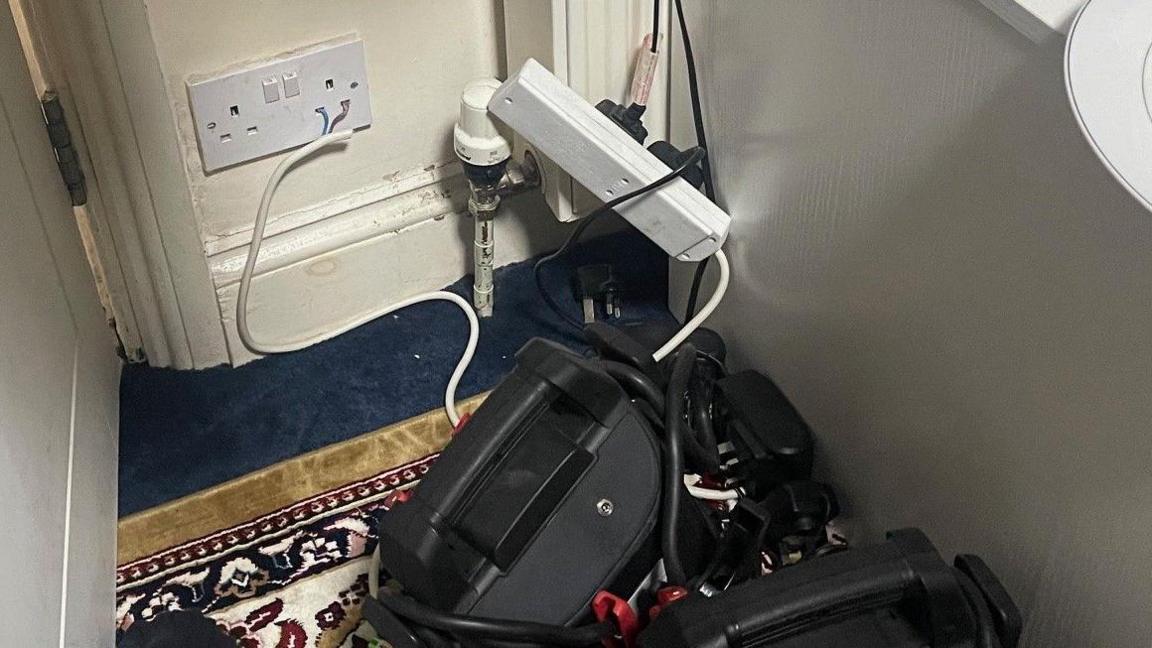
An extension lead was seen attached directly into socket holes, without a plug, while charging batteries
At the front of the house was a locked room, which the first tenant said belonged to the landlord's son.
Eventually the locksmith the team brought with them opened the door to allow the enforcement officers entry.
The room contained a double bed, a dresser and a desk. What appeared to be car or e-scooter batteries were charging from a plug socket near the door.
The wires were attached from an extension lead directly into the socket holes, without a plug. The team were concerned this was a fire hazard, and made a note.
They left a copy of the warrant on the bed, and the locksmith closed the room back up.
The first tenant we met told us he's moving out. He hoped his new room in his new house would be better.
"At least it has a window," he said.
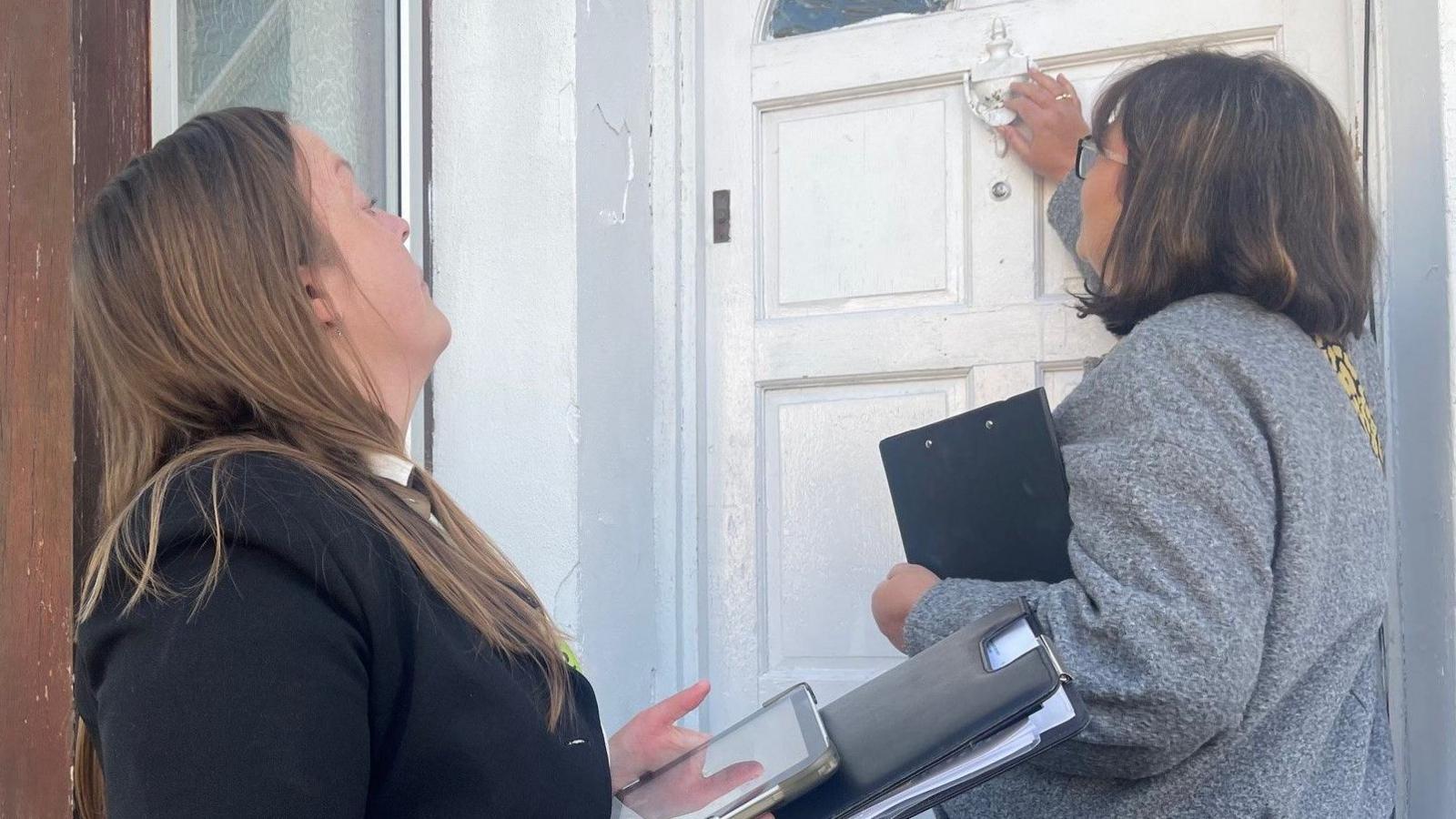
Council enforcement officers arrived with a warrant at a property in Walthamstow
We drove to a second address, this time in Walthamstow, on a residential street of terraced houses close to the high road.
The council enforcement team believed there could be eight tenants living at this address. They soon found there were significantly more.
An Afghan man opened the door and didn't want to let us in, but once he saw the warrant, he relented.
He said he had refugee status and had applied for housing but hasn't been given anywhere. He told me he paid £250 a month to share a room with another man, also a refugee from Afghanistan, who also paid £250.
He agreed that we could interview him on camera, but only if I didn't show his face.
He told me he worked long hours in a laundry, but was currently at home after he had an accident at work. He had some cuts and bruises on his face and arms. He showed me a photo of himself recovering in a London hospital.
He and his friend told me they spent many nights sleeping rough, in parks, on trains and in mosques. This room, they said, was better than that.
There appeared to be at least 13 tenants living here, from all over the world.
Three men from Pakistan said hello to us in the kitchen.
It's their living arrangements - not their immigration status - which interested the team.
This property also did not have an HMO licence. The enforcement team had made multiple unannounced visits over the summer, as well as serving a Section 239 notification under the Housing Act 2004, but they weren't able to gain access.
Everyone living here seemed to be working. These are the waiters, delivery drivers and labourers keeping London going.
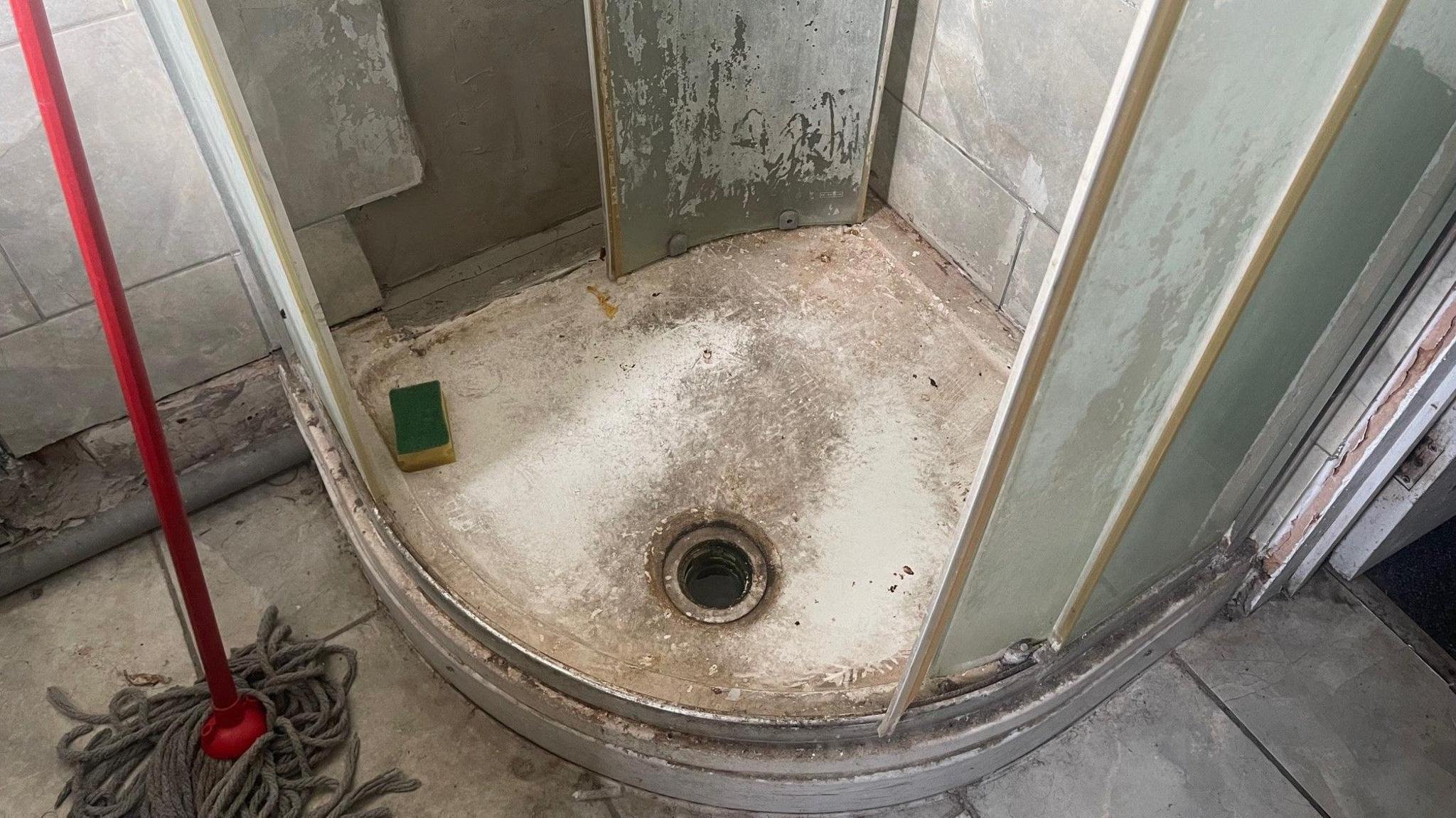
One of the bathrooms in the property had a dilapidated shower
There was only one working bathroom on the ground floor, shared between all 13 of the residents.
It had a shower which was not plumbed in properly and had a leak, causing damp and mould.
Another was on the first floor and had a working toilet but a dilapidated shower which someone has recently tried to use, with a mop and sponge next to it.
Someone had left a packet of cigarettes on the windowsill.
Downstairs the kitchen was filthy, mouldy and damp, with cockroach droppings in the cupboard under the sink. A wire net covered part of the ceiling plaster which had come loose, directly beneath the upstairs shower room.
The property also had bedbugs.
The plug sockets were loose and there were wires sticking out.
There was no communal living area apart from the kitchen.
It didn't have working smoke alarms, and the bannister rails and stairs were in disrepair. It also had an extra storey for which it didn't have planning permission.
Sandra McGrath said: "The tenants are really battling against odds.
"These are all communal facilities and so we would expect the landlord to keep things in good condition.
"People want to live in a comfortable environment but with so many people living under one roof it's creating additional fire risks.
"It's a three-storey property and someone who is sleeping on the second floor is really in danger of not being able to get out safely."
'Incredibly dangerous'
The locksmith opened the door into a single bedroom. A filthy bed had no sheets although it was clear someone had been sleeping on the grubby mattress.
The room smelt dreadful and it was clear the occupant sleeps, eats, maybe even cooks there.
There's a window which opened wide at floor level.
Enforcement officer Ms McGrath said it was "incredibly dangerous".
"If a child came into this room. Can you imagine the risk that they are in?"
But there was a smart wool suit covered in a clear polythene bag hanging up on a nail on the wall and a gentleman's umbrella next to it. This person clearly worked, and dressed accordingly.
Looking out across the gardens from the first floor window, a few doors down there was what appeared to be another HMO - future investigation work for the team.
For today though, they have enough paperwork to process.
"We've found an unlicensed HMO with at least 10 people living there, possibly more," said enforcement officer Lisa Smith.
"We will be continuing our investigation and taking enforcement action."
When they had gone, we had got one more stop. One of the residents had told me the landlord lived nearby.
I knocked on the door.
No-one replied.
Listen to the best of BBC Radio London on Sounds and follow BBC London on Facebook, external, X, external and Instagram, external. Send your story ideas to hello.bbclondon@bbc.co.uk, external